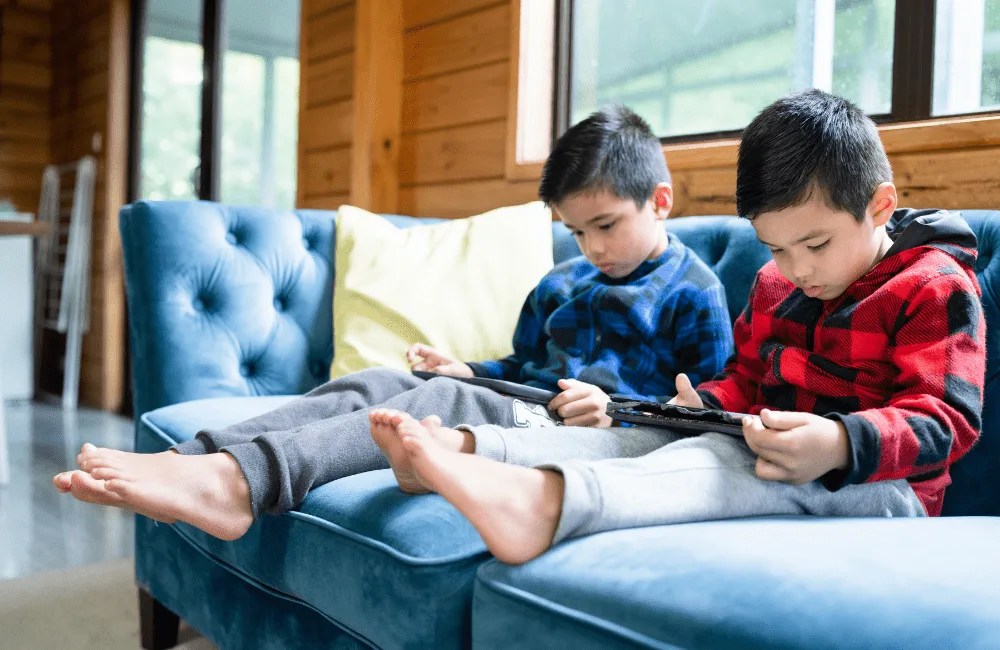Photo Credit: Canva
By using this site, you agree to our Terms of Use. This post may contain affiliate links. Read our disclosure policy.
These screen time tips and recommendations will help regulate your kids’ screen time so they have a healthy balance of screen and non-screen activities.
Parents, do you ever feel like your kids are glued to the TV or tablet? The average child spends over two hours a day watching TV and playing video games. This is too much time for kids to spend sitting in one spot. We know you’d rather have them crafting or reading books, but the reality is that screens are a part of our everdday lives. How we manage the screen time however is up to us.
There is a growing concern from parents about the effects these long hours in front of screens can have on their children’s development and mental health. In this article, you’ll find some screentime recommendations for kids. It’s important to establish healthy screen time boundaries for children and we hope these recommendations and guidelines will help.
Communicate with Your kids about screen time
You can talk to your kids and layout screen time limits for the week. Let’s face it in today’s technology-driven world, it’s impossible to be without screens, but it should be limited and monitored. You can set a screen time limit of 1-2 hours per day, or even less if your kids are younger. The screen time must also be scheduled in advance with specific screen time windows.
Provide education on screen time
The American Academy of Pediatrics has long recommended that children and teenagers should spend no more than two hours per day using screens, and children under the age of two should not use screens at all. The guidelines have been updated to reflect the expectations of today’s digital world, but they are still in effect.
The AAP now encourages parents to create a “Family Media Plan.” Know when you’re using media to achieve your goals by creating a Personalized Family Media Use Plan. Because of this, parents and users must consider what they want the applications to be used for. By creating goals and rules that align with your family’s values, you are more in control of screen time for your kids.
Set an example by limiting screen time yourself
Remember, your kids model what they see, so if you are on your phone all the time, you are sending a message that is acceptable behavior.
Try to limit screen time for yourself and give yourself dedicated blocks for it as you do with your kids. Also, make sure to have dedicated screen-free blocks at certain times with the kids.
Turn off screen time devices after dinner
Dinner is a time to bond and connect as a family without screens. It makes natural sense to continue this screen-free time and give kids an opportunity to do quiet things like reading, homework, or getting items prepped and ready for school the next day.
Limit screen time to less than 3 hours per day
I know we said above that it’s no longer recommended to set exact screen time hours, but in general limiting screen time to less than 3 hours a day is a good goal to have. It’s well researched that screen time can have negative effects on children, such as addiction and attention problems. Screen time should never take the place of sleep or physical activity. Screen time should also not be used as an incentive for good behavior. Parents need to make sure that they are setting limits with their kids about how much time they spend on screens each day and what content they are viewing when online.
Try not to use screen time as a reward
Kids’ screen time is not a reward for good behavior. If kids are being good, screen time is not how you should reward them. Vice versa, do not use screen time to punish kids. Screen time is a privilege, not a punishment or a reward. Screen time is something kids can use on their own to relax after school, on weekends, and on vacations.
Set screen time timers for young children
You can reduce screen time and meet your family media goals by setting screen time timers on your kids’ devices. It’s especially important to set those timers well before bedtime as screens disrupt sleep. Kids will likely sleep more soundly as a result.
Talk about screen time and the positive and negative aspects of it with your child
It is important to talk to your child about screen time. It can be good and bad for them. You should talk to your child about the varying type of screens. For example, acceptable Chromebooks for school and teacher recommended educational apps vs. passively watching YouTube unboxing toy videos.
Don’t let screen time become a substitute for physical activity. Screen time should not be used as a replacement for physical activity so much so that it may affect children’s abilities to perform in school or sports. Kids need to be active in order to keep healthy and happy. They also need time away from screen time in order to focus on homework, family time and self-care.
Talk about passive and active screentime. Passive is watching someone play games on YouTube. On the other hand, some screen time can be a positive outlet for kids.
– It teaches them critical thinking skills.
– It has the potential to teach kids about various educational topics
– It can help with problem-solving skills, parent-child relationships, and social interactions with others.
Limit screen time at night
Screen time right before bedtime can cause sleep issues. Turn off all screens at least 1 hour before bedtime, including TVs, laptops, tablets, and phones. Create a bedtime routine that doesn’t include screentime. Make sure to read books together – it’s important for your child to develop good reading habits early on in life. Dim the lights and turn make sure all other electronics are turned off.
Don’t allow screen time while doing activities that require concentration, such as homework or reading
Screentime during tasks that require your brain to think can cause distraction and additional eye strain.
Teach your kids healthy work habits by encouraging them to focus clearly on the task in front of them. This way they can be less tempted to go down the rabbit hole of checking social media or watch an entire episode of their favorite show.
It’s important for them to be present while they’re working, and screen time can really take away from that.
Read more parenting articles:
Be the Parent You Needed When You Were Younger
How to Raise Your Kids To Be Successful At a Young Age
Traveling Long Distances With Kids
Agnes Hsu is a mom of three and has been inspiring parents and kids to get creative with easy activities and family friendly recipes for over 10 years. She shares her love for creative play and kids food to her 2MM+ followers online. Agnes' commitment to playful learning and kindness has not only raised funds for charity but also earned features in prestigious nationwide publications.


